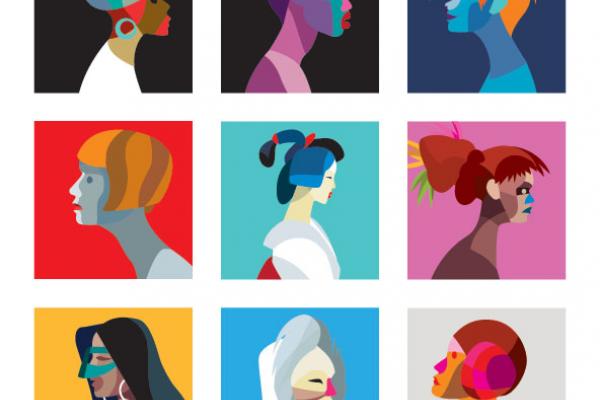Editor's Note: This post is an excerpt from the report "Peering Under Our Collective Burqa: How Do Our Own Religious 'Personal Status' Codes Cover and Diminish the Full Humanity of Women?" Read the full piece HERE.
March 8 came and went, the 39th observation of International Women's Day, a day set aside to collectively take stock of how the world’s women are doing. The theme for this year — Equality for women is progress for all — captures the spirit of this day to invite and remind us all that the better world we want to create for girls and women is indeed a better world for us all. This blog asks people of faith to hold a mirror up to ourselves to ask if we are in fact part of this “us.”
By nature an optimist, I do enjoy this day set aside to celebrate women’s accomplishments. Everywhere, women are bravely rising up above patriarchal customs and cruel forms of highly prevalent violence to “lean in” to their own economic and social and spiritual empowerment. There is indeed incredible momentum afoot in our world in so many sectors of society to really mainstream women's equality/gender balance not just as a "women's issue" per se but rather as a shared human concern, i.e., what is good for girls/women is also good for global development, good for society, good for relationships, good for families, good for healthy teams, good for organizational dynamics and even good for the "bottom line" of business.
Yet every year for the past few years as International Women’s Day rolls around, I feel a strange mix of both hope and despair as I hold the gender contradictions of our world close to my heart. Don’t be such a pessimist, I tell myself; be positive! Yet I cannot shake a refrain I have heard again and again from women’s human rights activists working around the world: “Here in our country, we have a decent legal code for women; however, in recent years we have experienced a backlash that is threatening to undo many of the strides that women have made.” However you fall on the optimist/pessimist scale, it is safe to say that women’s place in the world is still highly tenuous.
Here in the U.S., most women (and men) take for granted a set of basic human rights (i.e., to vote, own property, to drive, to access basic healthcare, go to school, marry freely, divorce, have custody of children, etc.) and we tend to presume that the women’s movement is almost in autopilot marching forward.
However, around the world, all these things are still very much up for grabs. Through my travels with the Global Fund for Women and other philanthropic endeavors, I have had the opportunity to meet and interact with some amazingly brave women’s human rights leaders who put themselves at great risk to continue the unfinished work of the women’s movement that exists everywhere in our world. Their perseverance and passion has have touched me deeply and I feel their uphill struggle in my own body. Again and again, what I see and hear and observe is that the biggest source of gender regression in our world today (next to maybe the commercial sex trade) is uniformly from within the ranks of religion.
I don’t know about you, but as a person of faith, this grieves me deeply. I continue to have faith in faith as a force for justice in our world, but if you look with neutral eyes at the impact of religion collectively on women’s ongoing journey toward equality, it is hard to say whether religion/faith is on balance an ally or a hopeless obstacle.
In honor of International Women's Day, during this month of March hold in your heart the precarious conditions that continue to surround women's day-to-day lives around the world. Whether you travel across the globe to Africa or the Middle East or stroll through the mall in your town, the world in all of its tensions and tragic complexity — its challenges and its opportunities — is right at the doorsteps of each of our hearts.
The theme song this year, "One Woman," conveys the collective intent of this day to see yourself — your mother, your sister, your daughter, your friend — in the woman hidden under the burqa, the girl working in the brothel, in the countless women who bear the scars of patriarchy on their bodies and their souls.
Women's unfinished journey toward full human equality is a collective human struggle. It is yours. It is mine.
Emily Nielsen Jones is Co-founder/President of the Imago Dei Fund, and is a donor activist engaged in promoting human equality, justice, and peace in our world. She is particularly passionate and engaged in the nexus of faith, gender, and development working to mobilize our faith traditions to more fully and unambiguously offer a spiritual ideal of gender equality to our world.
Image: Illustration of women and girls of different ethnicities, Jesus Sanz / Shutterstock.com
Got something to say about what you're reading? We value your feedback!
